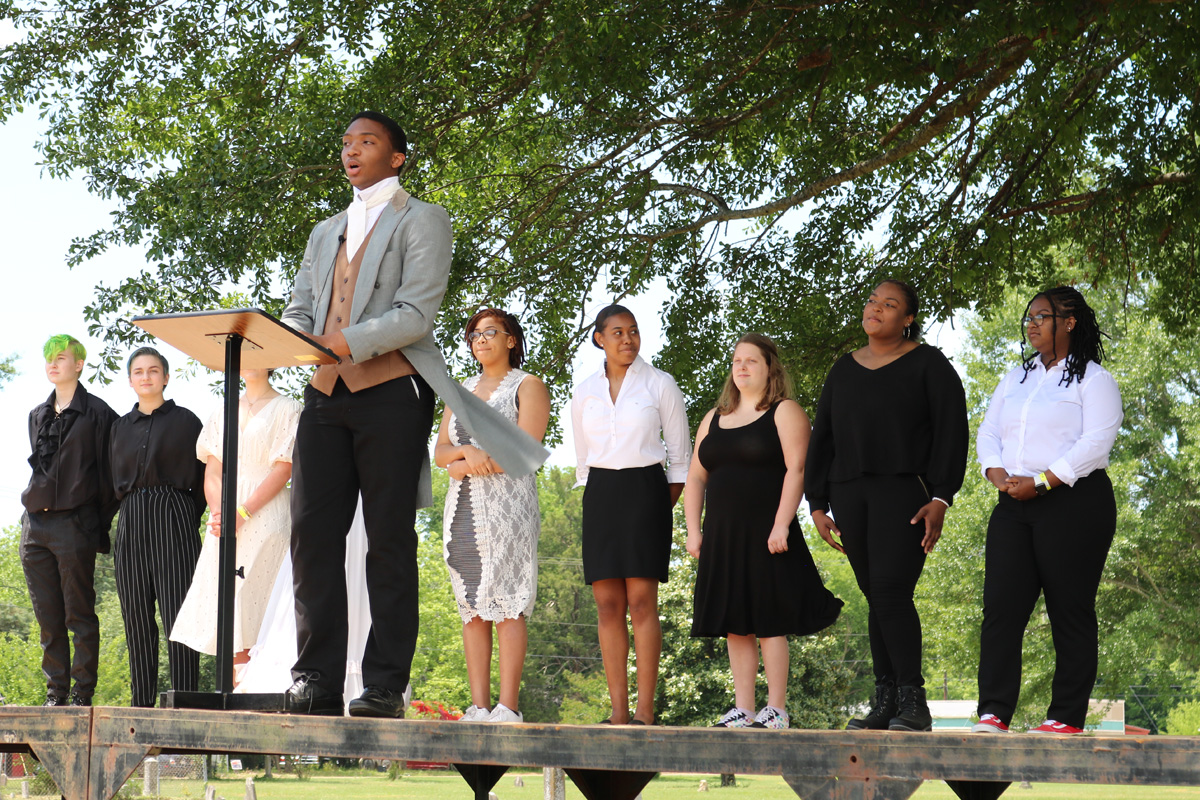A young woman steps onto the platform dressed in a white ruffled dress reminiscent of the late 19th century. As she begins to speak, her voice resonates among those gathered at the Sandfield Cemetery in Columbus, Miss. Her words commemorate the accomplishments of a man buried in a grave nearby who was married to the woman she is portraying, Violetta Clark Baker, a librarian of Congress. A group of her classmates stand close by waiting for their turn at the front of the stage, but listening intently.
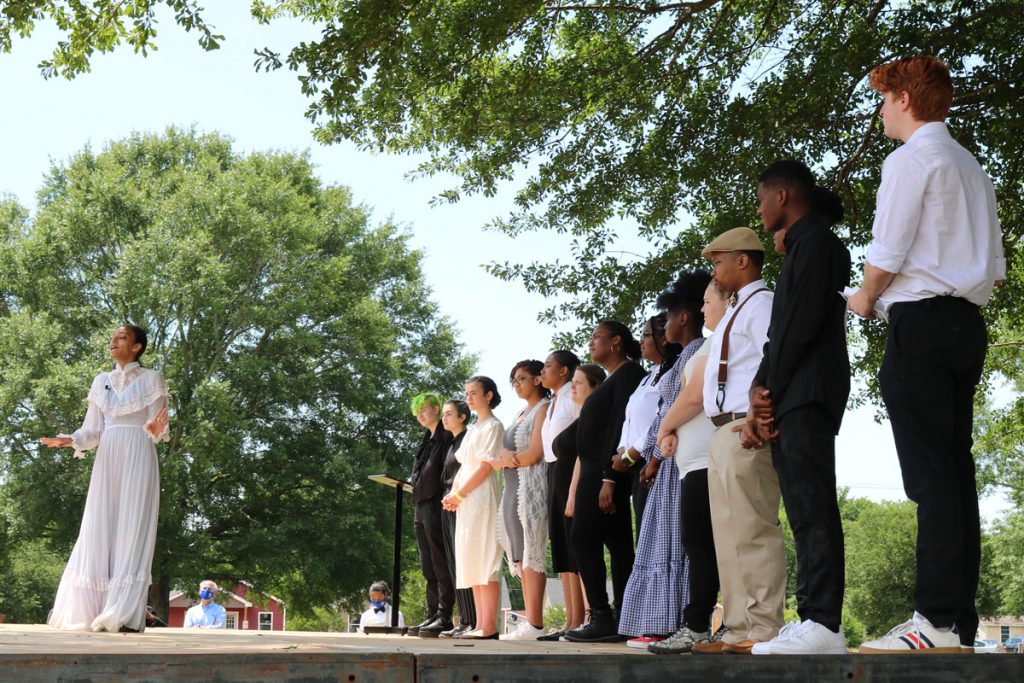
“Now I understand you folks would like information regarding Henry Edwin Baker, the first Black person appointed to the United States Naval Academy. I feel uniquely qualified to fulfill your request. …You see, Henry was my husband,” MacKenzie Knighten says, portraying Baker.
Behind the students, the leaves on the large oak tree standing protectively over the Sandfield Cemetery rustle ever so slightly. Despite the midday heat, those gathered sit quietly focused on the young lady. A laugh bubbles up from the audience before the silence of attention again fills the air, and they glance often at the faded and sometimes crumbling headstones littering the stage’s background. Knighten lauds his accomplishments leading up to the appointment as one of the first African American midshipman in its history, then describes the discrimination, harrassment, hazing, isolation and disrespect that Baker experienced at the academy.
“Henry did not take the abuse lying down. One student reported that Henry cursed at him, an act unworthy of an officer. The case went to trial, and the judge determined that the classmate had been harassing Henry and prompted a confrontation,” his “wife” continues. “The classmate was expelled. While found not guilty, Henry was also dismissed by the secretary of the Navy because the academy superintendent had requested it. Apparently, Henry’s presence was considered disruptive. Sounds to me like they were blaming the victim.”
The significance of the moment lingers.
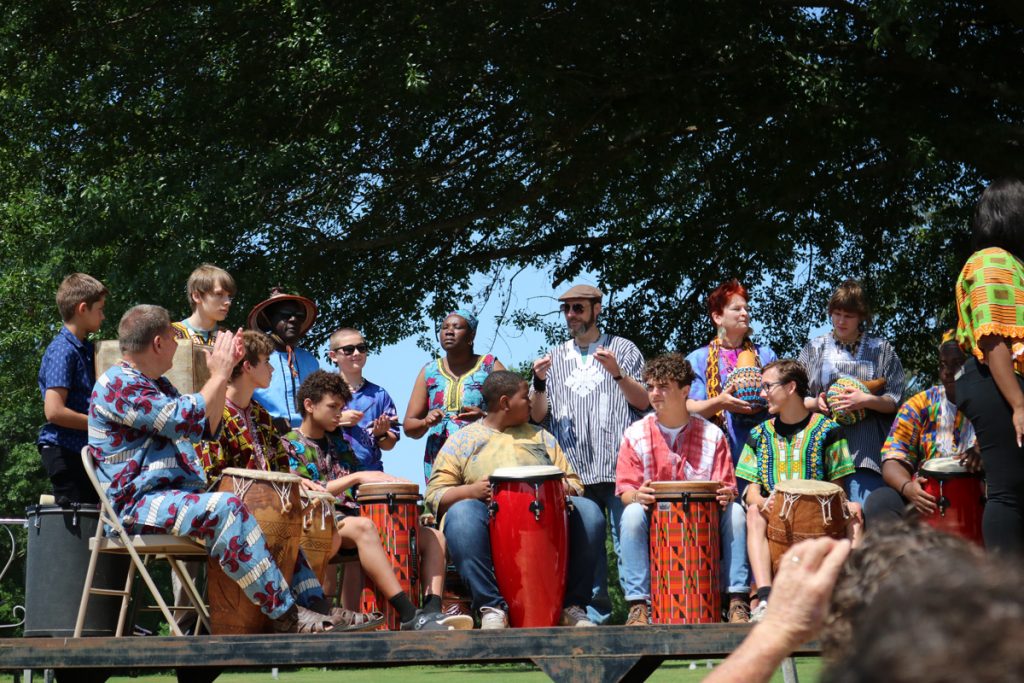
‘A Day Long to Be Remembered’
The 8th of May Emancipation Celebration is the culmination of an annual research project in Mississippi School for Mathematics and Science history teacher Chuck Yarborough’s African American history class. He gives students a list of local African Americans collected through his own investigation. Working in small groups, the students research their subjects using primary-source documents, then write an original script to be performed at the 8th of May Celebration.
This year’s speakers wowed guests with information about the accomplishments of prominent Black locals such as Richard Denthrift Littlejohn. Littlejohn, a successful newspaper editor in the last two decades of the 19th century, owned property in the heart of downtown Columbus that hosted important social, business and fraternal gatherings for Black residents. Members of the Columbus High School choir and the Mississippi State University Jembe Den percussion ensemble, which performs traditional African songs, also joined the celebration.
MSMS is a prestigious residential public high school in Columbus that enrolls academically gifted and talented juniors and seniors across the state. Yarborough, who has been at the school since 1995, began its 8th of May Emancipation Celebration in 2005 after a student came to him with a last-minute request.
“I had done a lot of local history research for a project for the local Convention and Visitors Bureau,” he explained. “In 2005/2006, there was a student named Renita Holmes, and she asked to do a Black History Month program and use some of my research, but she came to me on Feb. 26,” Yarborough says in a Zoom interview. “I told her that it was a little too late to do that but that we could do something on the 8th of May, which was the Emancipation Day.”
Black residents celebrated 8th of May in the Columbus area for more than a century. On May 8, 1865, Union troops arrived in Columbus from Alabama to inform the last remaining slaves that they were free. Yarborough’s introductory comments at the performance explained that a Quaker from Indiana named Cyrus Green chronicled the celebration African American citizens held one year later in his diary.
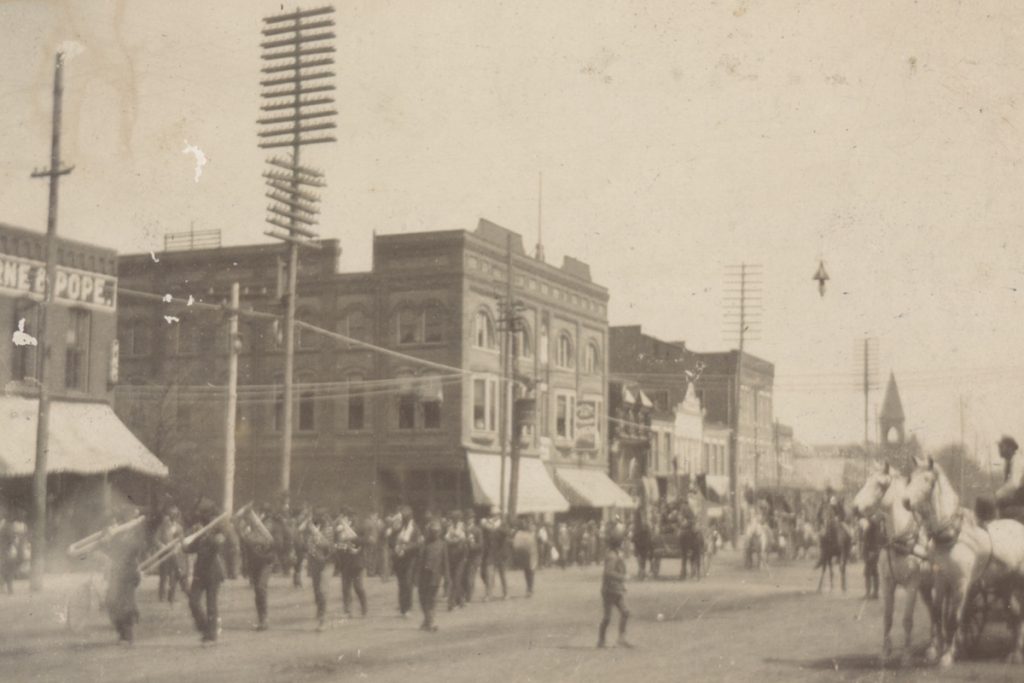
Green had come to the area to teach at a Freedman’s School during Reconstruction. By 1866, Columbus was the third largest city in Mississippi and home of the largest Freedman’s School in the state. A line of Green’s diary notes that “today is a day long to be remembered.” He recounts the initial celebration as one filled with food, music and speeches including one by Sen. Robert Gleed who became the first Black Columbus City Council member and the first Black state senator from Lowndes County. His accomplishments are re-enacted each year by Yarborough’s students.
“By the early 20th century, it’s being celebrated as Emancipation Day, but consistently in the newspapers here in Columbus members of the white community are acting like the Black community are celebrating on the wrong day,” Yarborough said. “They (were) trying to explain it away, which is really an attempt by local whites to take agency and control the African American experience in that particular celebration.”
Since that initial program by Yarborough’s students, his African American history classes have portrayed some of Columbus’ late-19th- and early-20th-century African American leaders through monologues and poems woven between songs performed by the school’s student-run Voices in Harmony gospel choir off and on for 15 years.
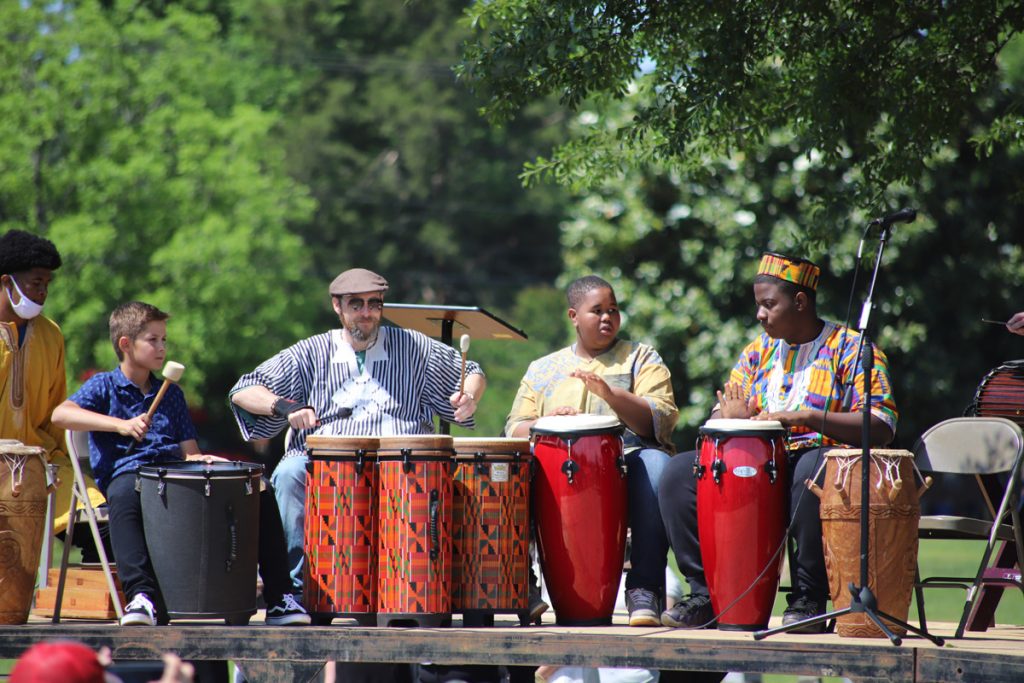
Stories Not Often Told
Knighten, a junior from Ruleville, Miss., says the project provided an opportunity for her and her classmates to learn the city’s largely hidden African American history. “Obviously, I learned about the people that he wanted us to research, but I also learned that African Americans had a deeper impact than many of us African American students have been told all of our lives,” Knighten said via Zoom. “Usually, all (you) hear about is slavery, Reconstruction, Civil Rights Movement. I was very appreciative to be in a class where I could research information about my people and about people in Mississippi.”
Senior Meghan Curry wrote a script about W. I. Mitchell. Mitchell was one of the first attendees at Alcorn State University. He later became the first black principal of Union Academy, the first free school for African Americans in Columbus and spent the next 40 years as an advocate for the educational rights of the Black community. Curry’s research helped her develop a deeper understanding of the complex impact that African Americans have had on the area.
“Being (part of this project) gave me the perception that African Americans were so much more than what is being told,” she said. “I’m glad that I was able to dig and find the stories that are not often told by society and tell them.”
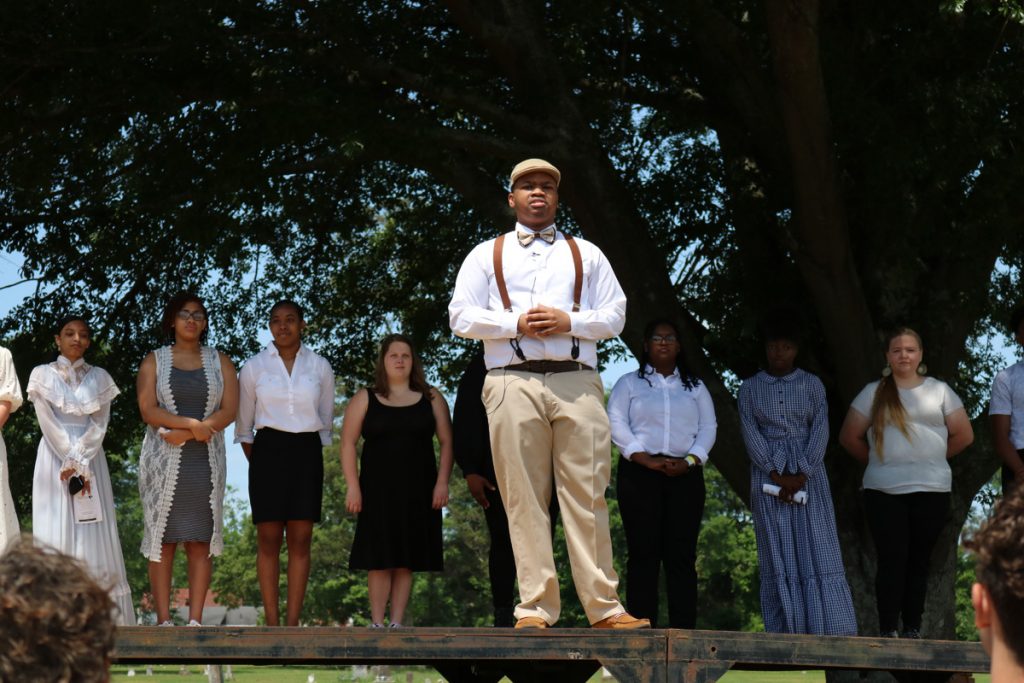
Many of the stories center around those buried in the historic Sandfield Cemetery. The Mississippi Civil Rights Project website says that most of the area’s freed slaves settled in the community of Sandfield. The most prominent feature of the area located between Frisco Railroad, 25th Street and Highway 182 is the cemetery of the same name.
With the Emancipation Proclamation, the town’s population grew by more than 3,000 by 1870. The graveyard is the burial site for many of the city’s most prominent African Americans from the late 19th century and eight African American Union soldiers who died in the Civil War. It is believed to be the oldest African American cemetery in the city and was purchased in 1854 as a response to complaints about whites and Blacks being buried together.
In May 2019, a historic marker was dedicated at the site largely due to the national attention the students’ program has garnered. The celebration has been featured in The Atlantic, U. S. News and World Report and the Chautauquan Daily. It is also featured in the HBO documentary “Our Towns.”
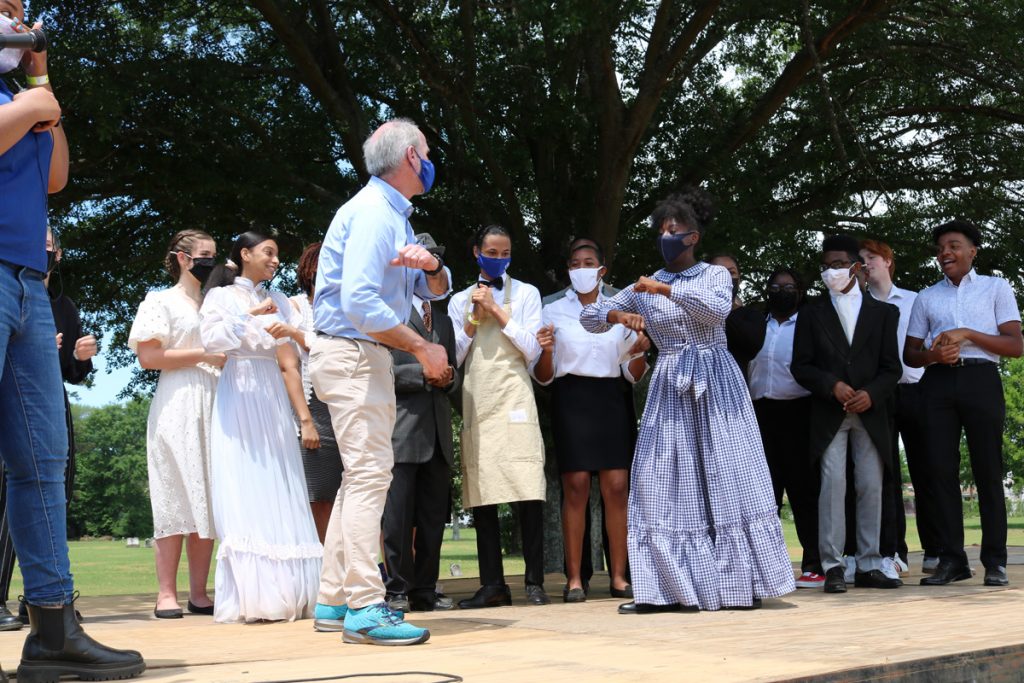
“We make a big impact locally. It’s appreciated, and it’s celebrated,” Yarborough said. “There has been a growing appreciation and understanding of the significance of that space as the burial ground of African American leaders in the late 19th and early 20th century. There has also been a growing appreciation of African American history beyond that cemetery and those people as a result of the growing awareness coming from our programs. The increased local interest has definitely grown with the external interest in our program.”
This year, dozens of students, parents and local citizens gathered for the Saturday morning performance. Curry, who served as an usher during the program, said that the response was positive, especially from her peers.
“We had several students who watched it, both juniors and seniors,” she said. “A lot of them told us, the performers, ushers, and everyone who had a hand in making the performance, how much insight that they gained from watching the program.”
Yarborough hopes that through the research project and the public program that students realize more about the heritage of African Americans and the power that they as students have to change the future.
“The goal of all education is to empower young people, and I hope that this project empowers my students by helping them understand that they have a story. They have a voice, and they can positively impact their community no matter where that community is,” Yarborough said.
“I believe that the world you can change ultimately is the world you can reach out and touch. They are in their performance reaching out to the community and helping to change it in positive ways.”
CORRECTION: The original version of this story contained a typo, listing Emancipation Day in Columbus as May 8, 1965, instead of 1865. It is corrected above with our apologies. Also teacher Chuck Yarborough has been at the high school since 1995, not 2005, the year he started the Emancipation Celebration project.

